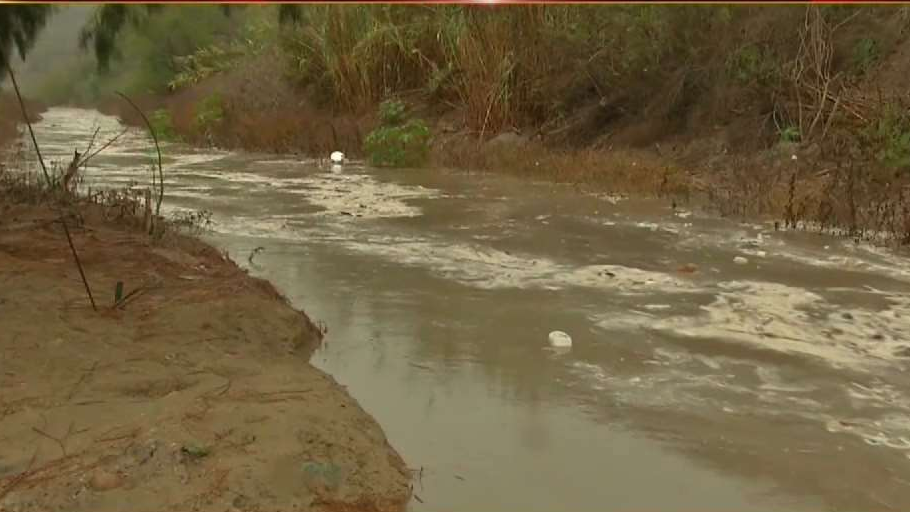A surprise inspection at an immigrant detention center in the Southern California city of Adelanto found significant health and safety risks to detainees temporarily held there, including nooses made from bed sheets discovered in more than a dozen detainee cells.
The inspection by the Department of Homeland Security's Office of Inspector General also found improper and overly restrictive segregation and inadequate medical care at the ICE Processing Center in Adelanto, more than 80 miles northeast of Los Angeles.
ICE officials said in a statement that "the safety, rights and health of detainees in ICE's care are of paramount concern."
"Adelanto, like all ICE detention facilities, is subject to stringent, regular inspections," said Lori Haley, an ICE spokeswoman. "Any compliance issues found during such reviews must be promptly addressed through a Uniform Corrective Action Plan. ICE takes seriously the OIG's findings, and has agreed to conduct a full and immediate review of the center to ensure compliance with detention standards and expedite necessary corrective actions."
The ACLU of Southern California called the conditions at the facility cruel and nightmarish.
"ICE has ignored the ACLU's repeated complaints about abuse and neglect at Adelanto," said Michael Kaufman, a senior staff attorney at the ACLU Foundation of Southern California, in a statement.
Kaufman said that ICE and the private company that owns and operates the facility, the GEO Group, Inc., "continue to disregard immigration detainees' well-being, often with tragic consequences."
Local
GEO Group officials said in a statement they take the findings seriously and say they are working on correcting them.
"Our commitment is always, first and foremost, to high-quality care," the statement read. "For over thirty years, our employees have taken pride in our ability to provide quality services in safe, secure and humane environments for those entrusted to our care, and these findings of inadequacies are not consistent with our core values."
The facility houses up to 1,940 detainees. At the time of the inspection in May, 307 guards oversaw 1,659 detainees housed in different facilities around the center, the report said. On one side, detainees lived in 16 housing units consisting of 18 cells each that can hold up to eight detainees per cell. On the other side, detainees resided in two housing modules with seven dormitories and an average of 94 detainees per dormitory.
"While at the center, we identified serious issues relating to safety, detainee rights, and medical care that require ICE's immediate attention," the report said. "These issues not only constitute violations of ICE detention standards but also represent significant threats to the safety, rights, and health of detainees."
In about 15 of the 20 cells they visited, inspectors found nooses made from braided bed sheets, which could be used in suicides, and is an ICE violation, the report said. A guard told inspectors it was a daily issue that was widespread, the report found.
"I've seen a few attempted suicides using the braided sheets by the vents and then the guards laugh at them and call them 'suicide failures' once they are back from medical," a detainee said, according to the report.
In March 2017, a 32-year-old man died after being found hanging from his bedsheets in an Adelanto cell, the report said. In the months after the suicide, ICE documented at least three suicide attempts by hanging at Adelanto, two of which used bedsheets, the report found.
"ICE's lack of response to address this matter at the Adelanto Center shows a disregard for detainee health and safety," the report said.
One detainee was improperly placed in disciplinary segregation and was in his wheelchair for nine days, without going to a bed to sleep, or brush his teeth, the report found.
The inspection found that some detainees didn't have proper access to medical care. Some were placed on waitlists for months.
Sometimes they were on waitlists for years to receive basic dental care, resulting in tooth loss and unnecessary extractions, the report said. Four detainees reported waiting weeks and months to see a doctor, the report said.
Detainees reported canceled appointments without an explanation, officials said in the report.
One detainee reported having multiple teeth fall out while waiting more than two years for cavities to be filled, according to the report.
"When we asked one of the dentists why fillings were not performed, he said he barely has time to do cleanings and screening, so as a result he does not do fillings," the report said.
One dentist suggested "detainees could use string from their socks to floss if they were dedicated to dental hygiene."
Editor's note: This story was updated Oct. 3, 2018 to add comments from the GEO Group.



